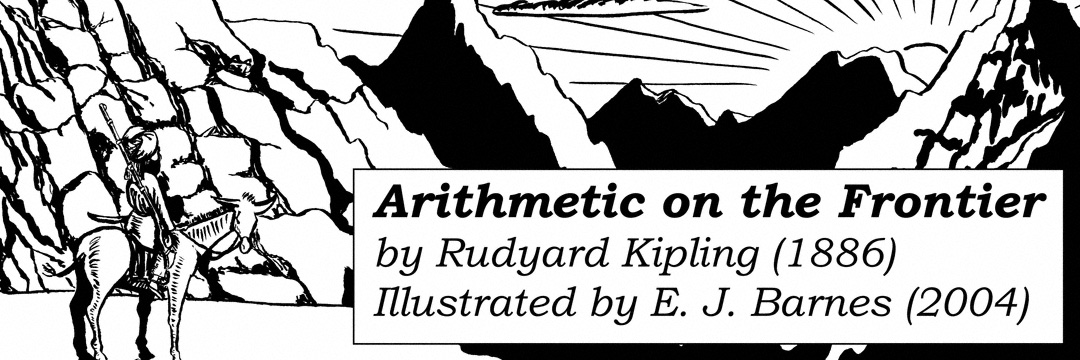
Arithmetic on the Frontier
A downloadable comic
Text by Rudyard Kipling (1865—1936). Art by E. J. Barnes. Poetry.
Much of the best-known work of Rudyard Kipling was based on his experience and observation as an Englishman in British India. His volumes of verse included Departmental Ditties (1886) and Barrack-Room Ballads (1892). He is well-known in the United States for the children’s books The Jungle Book (1895) and Just So Stories (1902). His writings have provided the source for numerous motion pictures, including Captains Courageous (1937), Gunga Din (1939), Kim (1950), The Jungle Book (1942, 1967, 1994, et al.), and The Man Who Would Be King (1975).
In the later 20th century, his reputation as the ‘poet of British Imperialism’ caused him to be widely reviled as an apologist. However, his work as a whole shows that he understood the price of Empire, to conqueror and conquered alike, with a subtlety often missed by both its boosters and detractors. It is Louisa Jo Killen’s recording of Peter Bellamy’s arrangement of “We Have Fed Our Sea” (from the poem The Song of the Dead) that caused me to seek out those of Kipling’s poems that might shed light on our own, more recent entanglements in Central Asia.
Kipling’s poem “Arithmetic on the Frontier” (first published in Departmental Ditties) focuses on the chilling economics involved in the British Empire shipping its public-school (i.e. prep-school) and University graduates off to the Afghan wars, only to be shot to pieces by men whose equipment, let alone education, cost next to nothing. The full text of the poem is illustrated in comics style by E. J. Barnes.
8pp (6 comics pages, 2 pages notes), b&w. Content warnings: War; gun, sword, and bayonet violence.
| Status | Released |
| Category | Comic |
| Author | Drowned Town Press |
| Tags | afghan-wars, Black and White, Comics, history, poetry, War |
| Average session | A few minutes |
| Languages | English |
Purchase
In order to download this comic you must purchase it at or above the minimum price of $1 USD. You will get access to the following files:

Leave a comment
Log in with itch.io to leave a comment.